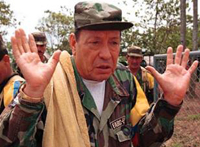Eleven kidnapped lawmakers die to bury stillborn peace talks in Colombia
Eleven provincial Colombian lawmakers kidnapped by leftist rebels died last week in crossfire during a military rescue attempt, in what analysts consider a serious setback for peace negotiations promoted by the government. According to the Revolutionary Armed Forces of Colombia, or FARC, the men killed were part of a group of 12 congressmen captured by leftist rebels in Valle del Cauca’s capital city of Cali and taken to secret jungle camps in 2002.

"Eleven deputies of the Valle assembly who we took in April 2002 died in the crossfire when an unidentified military group attacked the camp where they were," said a statement issued by the FARC. It said the raid occurred on June 18. The government said it did not know the location of the 12 hostages and did not know of any attempt to rescue them.
"There was no rescue order," Interior Minister Carlos Holguin replied, sparking doubts about the military move. Relatives of the allegedly killed hostages were awaiting confirmation of the news late on Thursday. As usually in these cases in Colombia, relatives protest authorities for not trying to obtain a negotiated release of their kidnapped family members.
The 12 were among about 60 high-profile hostages, including three American defense contractors and French-Colombian politician Ingrid Betancourt, who President Alvaro Uribe wanted to swap for guerrillas held in government jails. Betancourt was taken by the guerrillas during her 2002 campaign for Colombia's presidency. The Americans were captured the following year while on a mission to locate coca crops used to make cocaine.
If finally confirmed, the bloodshed comes in a very delicate moment, as Uribe’s government has recently released dozens of jailed guerrilla militants unilaterally, waiting from a gesture from the FARC. Colombian authorities have even released a prominent top official of the FARC, Rodrigo Granda, who flied to Cuba to set up the basis for peace talks. The FARC unauthorized Granda, who was a spokesman of the group, as they claim free areas in the country’s jungles to begin talks.
The government blames the FARC for a series of bombs that killed three people, including a 3-year-old girl, and injured dozens in the Pacific port city of Buenaventura last weekend.
Uribe, whose father was killed by the guerrillas more than 20 years ago, said the attacks reinforced his refusal to grant the FARC's demand for a safe-haven area to negotiate a hostage swap. He said the option of military rescue remained open.
But relatives of the hostages, as well as foreign governments involved, are reluctant to this methodology and prefer swap agreements. French President Nicolas Sarkozy is trying to broker a deal to release Betancourt safely, but the FARC has repeatedly refuse to conditions imposed by the administration in Bogota.
Uribe and the FARC have yet to agree on terms for negotiating the hostage exchange. Colombia is in a four-decade-old guerrilla war in which thousands are killed and tens of thousands forced from their homes by violence each year.
The President has been also accused of developing close ties with far-right death squads, which were organized and financed in the eighties to fight leftist insurgency. A series of scandals has revealed that an expectedly large number of Colombian lawmakers and officials have financed these paramilitary groups to obtain support from them. Many of them were close collaborators of President Uribe, including his former Foreign Minister, Consuelo Araujo.
Hernan Etchaleco
Subscribe to Pravda.Ru Telegram channel, Facebook, RSS!


